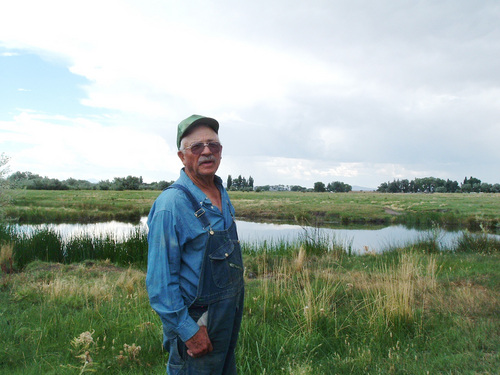This is an archived article that was published on sltrib.com in 2014, and information in the article may be outdated. It is provided only for personal research purposes and may not be reprinted.
Cecil Garland died on Mother's Day.
Cecil didn't need to wave a gun to endure in the battles that always seemed to find their way to him. His wit, wisdom, common sense and eloquent manner of speaking were more than enough to twist the opposition into knots.
I first met "Cec" in 1979, when I was covering the U.S. Air Force's proposal to deploy a massive ballistic missile underground shell game called the MX in the Great Basin Desert of Utah and Nevada. It was at a "community briefing" the Air Force had put together to explain why the MX was such a great idea. There among the attendees was this cowboy who introduced himself to me at the end of the affair and then proceeded to drag me out of the room for one of what would become many, many "talks" over the years.
I never tired of those conversations and, when I could, I'd drive out across the old Pony Express trail to Callao at the foot of the imposing Deep Creek Mountains, just to be able to see the man and hear what he was thinking about at any particular time. We were graciously hosted on more then a few occasions at his historic home that had once served as a stop on the stage route to California.
Cecil did a lot of thinking. Thus, he had a lot to say. Pretty much all of it made sense. Making sense was what he did for most of his 88-year run on this rock. I don't know how many stories he was a part of over the years. A big bunch would be a way Cecil might put it. The Air Force battles. Wilderness. Land and water conservation. On it went.
If he set his mind to it, things got done.
When these fights were not blowing up on his front porch, Cecil taught himself range science. Working together with his assigned BLM range scientist, Cecil created an innovative "reverse rotation method" for grazing his cattle. (Working together with the BLM! Remarkable!) Soon, his public leased lands became markedly better than anything for miles and miles in any direction. He paid his grazing fees.
Which brings up a point: This humble, witty gentleman of the West was able to help shut down a multibillion dollar nuclear weapons program. Then later on, another massive Air Force weapons program. In between, he helped get a wilderness bill passed for his beloved Deep Creeks and, lately, he was in the middle of the fight to block Las Vegas from pumping ground water out of the Great Basin.
Cecil Garland was able to do all these things and more without ever assembling an armed "militia." He never denied the existence of the federal government. He never threatened to get into a firefight with the authorities in the name of "patriotism."
Cecil defied being labeled. He was a human being who understood that human beings need intact, unscarred natural ecosystems to be sustained. He didn't look at wilderness as a "locking up" of the land. He looked at undeveloped wild lands as critical habitat for animals and plants and the clean water vital for a healthy planet. He knew that there was a right way to do things and a whole lot of wrong ways. He knew that digging up the desert to bury weapons that could end the world was one of those wrong ways.
He also knew that pointing guns in an argument was a very wrong way to do things.
Throughout all the fights in which he became engaged, Cec remained polite, funny and engaging to all – even to those who stood in direct opposition to his causes.
Cecil and Annette told my son a story years ago about how Mark Twain once stayed in what later became their Callao home as Twain stage-coached his way to California.
I can now clearly imagine Cecil and Mark finally having the chance to sit together for a chat. I'd pay to see that.
John Harrington is a writer and a longtime journalist based in Utah. He lives in Salt Lake City.



